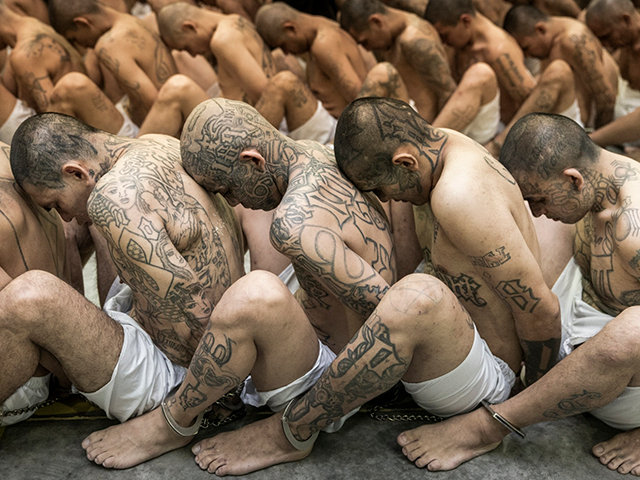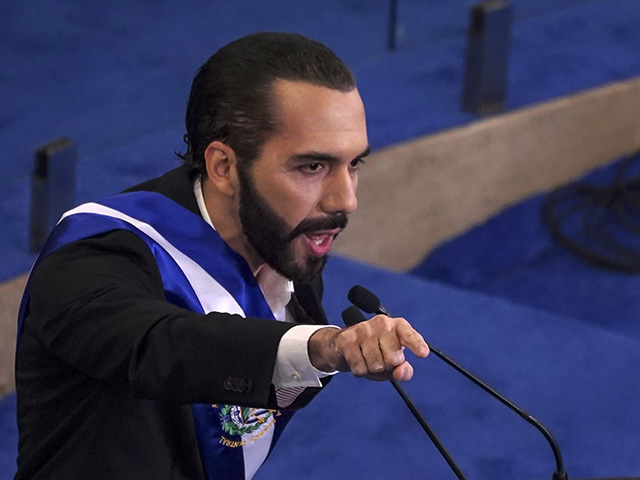The Congress of El Salvador approved transitory provisions and reforms to the nation’s criminal code on Wednesday that will allow courts to conduct mass trials for the tens of thousands arrested in President Nayib Bukele’s crackdown on criminal gangs.
The changes, approved by the overwhelming pro-Bukele majority in Congress with 67 votes in favor and six against, will allow Salvadoran courts to hold trials for groups of defendants based on their area of residence and what “clique” gang group they stand accused of belonging to. The changes also allow for prison sentences for those found to be gang leaders going from 45 to 60 years.
#Plenaria116✍🏻 Con 67 a favor, aprobamos Disposiciones Transitorias Especiales para el Procesamiento de Imputados Detenidos en el marco del #RégimenDeExcepción. pic.twitter.com/vUAv9WsonI
— Asamblea Legislativa 🇸🇻 (@AsambleaSV) July 26, 2023
The lawmakers argued that the modifications will grant greater order and efficiency to the processes in the courts. Detractors accused the government of legalizing the violation of due process and stripping detainees of their individual presumption of innocence.
El Salvador has been under a de facto state of martial law through a “State of Exception” decree since March 2022. The decree is meant to combat violent gangs such as Mara Salvatrucha-13 (MS-13) and 18th Street. The original 30-day decree has been continuously renewed on a monthly basis and was renewed for a sixteenth time on July 11.
El Salvador’s authorities have reportedly detained 71,976 people accused of being in gangs under the State of Exception, a number that represents one percent of the nation’s entire population. Bukele’s crackdown on gang violence has resulted in a dramatic reduction in gang-related violence and the “virtual disappearance” of the gangs in the nation’s communities. Bukele claimed in May that El Salvador had recorded 365 non-consecutive days without homicides since he took office in 2019.

Inmates identified by authorities as gang members are seated on the prison floor of the Terrorism Confinement Center in Tecoluca, El Salvador, Wednesday, March 15, 2023. (El Salvador presidential press office via AP)
The reforms approved by El Salvador’s Congress also establish that those detained under the State of Exception regime — which allows the nation’s authorities to conduct arrests without a warrant — can remain in prison for up to 24 months before the Attorney General’s Office brings them to trial or orders their release.
Salvadoran Justice Minister Gustavo Villatoro stated to the French news agency AFP that the recently approved reforms may allow the country’s judges to process groups of more than 900 people at a time in a single hearing if they are accused of belonging to the same criminal organization.
“There is nothing similar in the history of the world to what we are facing right now,” Villatoro said. “There are more than 900 charges per [gang clique cell] in this transitory decree.”
Salvadoran lawmaker and third vice president of the nation’s Congress Guillermo Gallegos explained to AFP that, thanks to the transitory provisions approved, the Prosecutor General’s Office will not have to present individual evidence against gang members in a criminal judicial process.
“This will make it easier for the Prosecutor’s Office and the courts to prosecute gang criminals,” Gallegos said.
Gallegos added that the Prosecutor’s Office will be able to “use in a judicial process the same elements of evidence against a group of gang members when they belong to the same cell or operate in the same geographic area or have participated in the same criminal act.”
Opposition lawmaker Cesar Reyes from the center-right Nationalist Republican Alliance (ARENA) told Reuters that the reforms “clearly violate fundamental principles of presumption of innocence because today we have captures where the police and the armed forces have simply cataloged any person as a suspect and have detained them.”
Ingrid Escobar, of the Salvadoran non-government organization Humanitarian Legal Aid, told Reuters that the country was “returning to the inquisitorial era” with the reforms.
“It is serious because they are going to charge people with crimes they have not committed, for simply linking them to a criminal structure,” she commented.
Opposition leftist lawmaker Jaime Guevara of the leftist Farabundo Martí Front – which Bukele belonged to and was expelled from before becoming president – criticized the new law, asserting that it “only seeks to resolve the collapse of the judicial system due to the thousands of arrests under the emergency regime.”
Bukele’s crackdown on El Salvador’s gangs has been instrumental in maintaining his continued high approval ratings. The Salvadoran president is seeking to be reelected in 2024 despite the nation’s constitution explicitly forbidding it, a move that his detractors have denounced as a way to perpetuate himself in power.
Christian K. Caruzo is a Venezuelan writer and documents life under socialism. You can follow him on Twitter here.



